With the WF-1000XM5 finally revealed, I wanted to create an in-depth analysis of the design, features and do a comparison with the WF-1000XM4. This is not a review, but I hope to have one in the future once I buy it. But I will need to save up before that happens. So let us dive in.
Design
The most obvious change is the new design. Sony has drastically reduced the
new mark 5's size and weight. We are looking at 25% smaller size and 20% less
weight (5.9g per earbud, 39 grams for case). The size reduction will be
welcome by many, including myself. The WF-1000XM4 can become uncomfortable
after an extended period of time in my experience so I expect this issue may
have been solved with the new design.

Aside the size and weight changes, the new glossy design will split some
opinions. When I first saw the original certification photos back in March, I
was hoping the materials would change for the final production unit. But this
turned out not to be the case. A common remark is that they look cheap, and I get that, but from my own experience with the WF-1000XM4, it can get dirty and cleaning the matte plastic can be a hassle. Now with the new model, the area that touches the ear is glossy and should be easier to clean. Of course that appears to be the idea. Whether this is true in practice remains to be seen. Of course I will still need to see in person to make a final judgement. I wonder if we could see a similar design change with the WH-1000XM6 when it
arrives next year.
For a size comparison, Sony has provided us with a nice set of reference
images on their product pages. In the photo below we have the WF-1000XM5,
LinkBuds S, and WF-C700N. I used the ear mesh as my size reference.
This comparison shows that the mark 5 is more or less the same size as the
other 2 and has a similar ear tip orientation like the WF-C700N. So if
you own either the LinkBuds S or WF-C700N, the new WF-1000XM5 should have a
similar fit and comfort. This is good news for me, since the WF-C700N is
really comfortable, even for long listening sessions.
Finally here is a comparison of the WF-1000XM3 and WF-1000XM5 from the Sony Store Ginza Twitter account.
Charging Case
For a size comparison of the charging case, we can thank the
Sony Engineer interview for these 2 comparison photos.
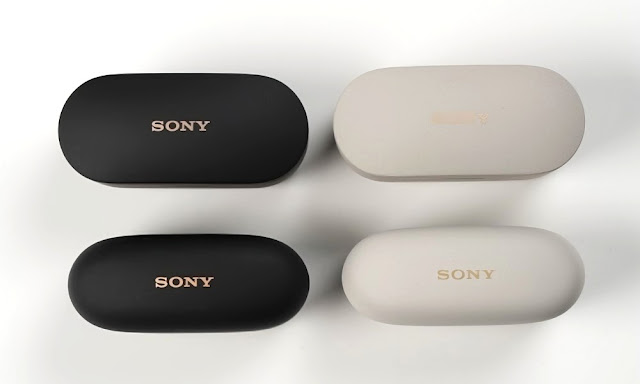
|
WF-1000XM4 (top), WF-1000XM5 (bottom)
|

|
WF-1000XM4 (L), WF-1000XM5 (R)
|
Comparing the designs, we can see the new case is a lot more rounded with softer edges. The interview reveals that the inside of the WF-1000XM4 lid
is made from resin, where as in the new model, this same part is made from
silicone, which helps protect the earbuds.

|
|
Sony WF-1000XM5 WF-1000XM4 charging case comparison
|
The rear of the case also has a pairing button like the LinkBuds S and
WF-C700N. Wireless charging is still present, and uses the Qi standard. From reviews online,
and even in these press photos, the colour of the case (and earbuds) appears to be a
slightly different colour. I think it is the same black as the WH-1000XM5.

|
WF-1000XM4 (L) - WF-1000XM5 (R) tips
|
New Earbud Tips
Another change are the earbud tips. Sony describes them as "Noise Isolation Earbud Tips" and says they are made from an exclusive material which enhances the fit
but also comfort thanks to their newly designed shape.
The new tips appear to have a similar construction to previous ones found in
the WF-1000XM4. We have a silicone center layer surrounded by the polyurethane
foam. The foam is much thinner on the bottom which should permit a better
squeeze and fit in the ear canal.
In addition Sony has included a mesh in the opening to keep out dirt and grime
from the inside of the earbuds. This mesh will require cleaning, so it will be
interesting how well it stands up to constant cleaning.
We have the new model name of the ear tips, EP-NI1010. The new tips will be
available starting September 1st in Japan. No word if they will be sold
outside of Japan. The tips will be sold in individual sizes, priced around
2000 yen each. The WF-1000XM5 will ship with 4 sizes of tips, SS, S, M, and L.
The previous tips, EP-NI1000, are already discontinued. I will be buying up a
few pairs of the new tips for my WF-1000XM4 and WF-C700N, to test them out later this year. I do not expect a
huge improvement in sound quality but hopefully the comfort and seal will improve.
New Features added to the list
The new WF-1000XM5 brings a few new features like gesture control and head
tracking. With gesture control you can nod your head to answer a call or shake
it to deny the call. The head tracking will be used for various applications
like 360 Reality Audio or TIDAL. But the functionality will require a firmware
update as it will be available Summer 2023. This could mean, August, or it
could be early September. Head tracking was recently added to the
WH-1000XM5 via a firmware update.
The updated Sony headphone app also has a new feature called "Find your
Equalizer". You play a song you like in the player, go back to the app, then click Find your equalizer. With the song playing, you have 5 EQ settings to choose from, which you can preview by selecting them. Once you find one you like, you click next, this is repeated 2 more times. At the end, you can see compare the selected EQ with your previous settings. The app is meant to optimize the EQ to a person's listening style. The feature is still in beta and it does work well. It choose a pretty close EQ to what I was using for my WF-1000XM4. I expect the feature will improve with time.
Other features remain the same like DSEE Extreme, Voice Assistant support,
quick attention, and ambient sound mode, Fast Pair for Android, and Swift Pair for
Windows also help with pairing. I am aware that there are some changes to the tap function but I suggest looking at reviews for that information.
New Dynamic X Driver
Sony has opted not to add any balanced armature drivers to the WF-1000XM5 (boo), but
we do have a new larger (8.4mm) driver. We get a closer at the driver and what
is new thanks to the
Sony Engineer interview. In the first 3 photos, we can see a real life comparison of the WF-1000XM4 and
WF-1000XM5 driver size.

|
WF-1000XM4 (L), WF-1000XM5 (R) driver comparison
|
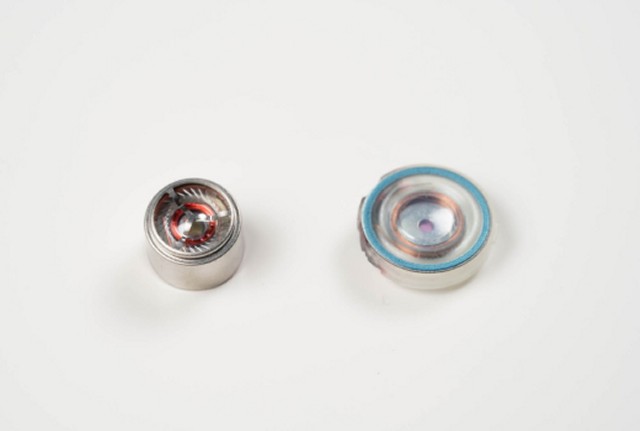
|
|
WF-1000XM4 (L), WF-1000XM5 (R) driver comparison
|
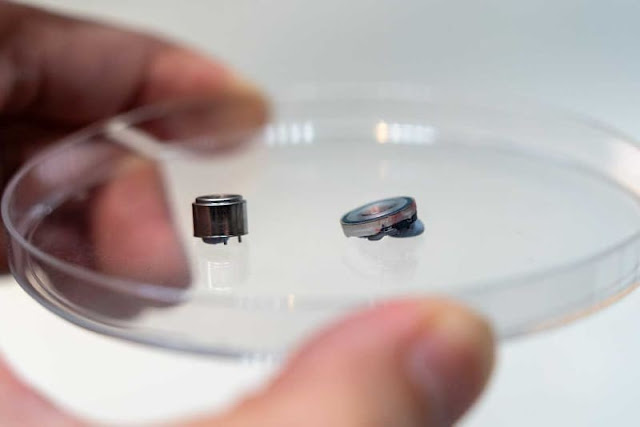
|
WF-1000XM4 (L), WF-1000XM5 (R) driver comparison, photo courtesy of
AV-Watch
|
We can see the new driver is bigger but also flatter, similar to what we
see in Sony's WH line of headsets. In the interview, the engineers say that
there are 2 methods for high sound pressure reproduction. First, using a
larger diaphragm to increase the vibration area, and second using a small
diaphragm to generate a larger vibration amplitude. Sony uses the former in the
new WF-1000XM5, where as the latter was used in the WF-1000XM4.
The interview also reveals that the new driver diaphragm is composed of 2
different materials, the central dome is more rigid, helping recreate higher
frequencies which are clearer and higher; where as the outer edge is softer
and more flexible which helps reproduce deep low frequencies. This design is
similar to the WH-1000XM5 diaphragm.
We do have a close up of the driver from the WF-1000XM5 product page. I
suspect this is the idealized rendered version, but it does provide a nice
close up of the design.
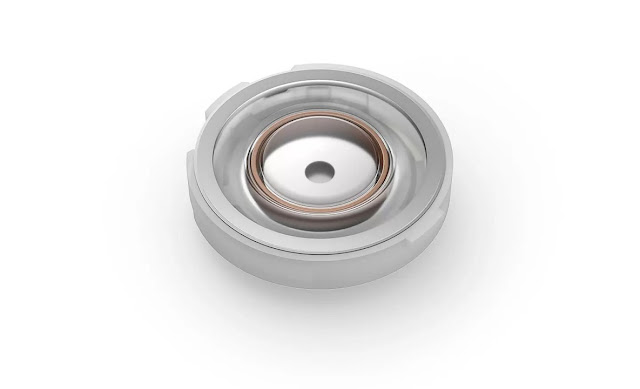
|
|
Sony WF-1000XM5 Dynamic X Driver
|
In this next photo, we can get a good idea of how much space each driver takes up
inside the earbuds.

|
| WF-1000XM5 (L), WF-1000XM4 (R)
|
The driver in the WF-1000XM5 takes up a lot more space in the earbuds, which
themselves are smaller than the WF-1000XM4, where the driver seems much
smaller with respect to the other components. I am looking forward to
comparing both devices in the future together.
Also one more thing, in the product video, there is an exploded view and we
can see a piece of plastic that is some kind of cover that goes over the main outlet of the earbuds.
It covers the entire bottom of the earbuds, perhaps creating a seal with the
outside, maybe for the IPX4 certification. Silly question, would this plastic
piece not dampen the sound coming from the driver? I am also wondering if it
is glued in or just pushed into place.
Noise Cancellation
One the major selling points of the WF-1000XM5 will be the noise cancellation.
Sony claims they are the best noise cancelling headset on the market right
now. (July 2023) Because the new driver is able to produce more sound pressure, it is able
to produce more accurate cancellation waves in the lower frequencies to cancel
out noise.
The new model now features 3 NC mics per earbud. When I first saw the product
video, I was puzzled why there was a microphone in the middle of the earbuds
with no hole.
Reading the press released explained the reason:
The WF-1000XM5 now feature three microphones on each earbud, including dual
feedback mics, which improve low-frequency cancellation performance. This is
Sony’s biggest ever step forward in noise cancelling, resulting in ambient
sound captured even more accurately.
This is also expanded upon in the
Engineer interview,
the extra feedback microphone in the middle of headset helps with cancelling
the lower frequency range. In addition, the microphones are newly developed,
smaller in size and have less noise. Although I am uncertain if this is
referring to all 3 NC mics, or just the additional feedback one. For
comparison, Apple decided to increase the size of the microphones in their new
Beats Studio Buds +, but I cannot find any teardown photos of the new model to
compare the mic size with the older model.
From my understanding, Sony uses the same mic for voice and feedforward NC
in the WF-1000XM5, like in the LinkBuds S. It is an interesting decision, I
suppose if it works in the LinkBuds S, it would work here as well. The
absence of a dedicated voice mic does not bother me, but if the call quality
is not improved over the WF-1000XM4, then I could see this being an issue
for users who use the voice mic a lot. Sony has
released a firmware update to address the rather mediocre voice call quality.
Could Sony have fit in a 4th microphone for voice? Good question, perhaps,
but maybe the benefits of a 4th microphone outweighed the costs.
The two feedback NC microphones are positioned in 2 different areas, the
first microphone is inside the audio canal, with the second microphone
closer to the driver. The placement of the NC microphone in the audio canal
is why the eartips now require a mesh, since none exists on the actual
unit.
Going back to the earlier part where there is a plastic cover over the outlet, I wonder how the flex PCB with this microphone goes out, maybe there is a notch in the plastic cover? Or perhaps the flex PCB just fits between the cover and case? Hopefully this can be revealed in a teardown.
The noise cancellation is improved according to Sony, who have a graph on the Japanese product page. According to the graph, there are improvements in the low to mid frequency ranges. The new model looks to also improve the cancellation of human voices, which is an area NC struggles.
The photo is not very technical, so I decided to combine the ANC performance charts from 3 Sound Guys reviews, the
WF-1000XM3,
WF-1000XM4, and
WF-1000XM5.
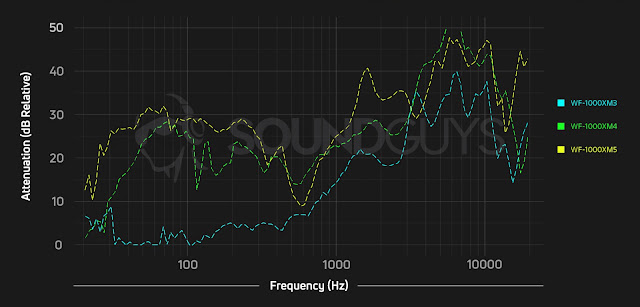 |
source: www.SoundGuys.com
|
The higher the graph, the better the headset can cancel out the noise in that frequency. I will not be discussing the WF-1000XM3, but I added it just for comparison to see how much both the mark 4 and 5 improved.
The WF-1000XM5 does appear to have better ANC performance overall, even in the low end. The mark 5 dips a bit below the mark 4 around the 600 Hz area, but recovers and surpasses it at around 900 Hz. At 3000 Hz, the performance begins to jump around, with one model better in certain points and the other better at other points. But this is just technical information with real world performance probably varying.
Sony V2 and QN2e Processors
We first learned of the 2 processors from the leaks, but now we have a bit
more information why the extra processor was required. Because Sony added a
second feedback NC microphone inside, additional processing power was
required. This is where the QN2e comes in.
We have little information about the QN2e, it could be a new chip, or an
evolution of the QN1e, whatever the case I suspect it will be close to the
QN1e's design as seen below.

|
CXD3871 (QN1e) block diagram
|
Sony does have a CXD3782 chip which has 3 microphone inputs, but it uses a lot more power, 13mW, versus only 7mW for
the CXD3871. We will probably have to wait for a teardown to identify the
chip. Perhaps the FCC filing will reveal the chips under the metal cover,
just like we saw in the LinkBuds S, but if not, maybe 52Audio will perform a
teardown and remove the lid to reveal the chips. If that does not happen, I could always try to fund raise for a teardown and take one apart myself if people would want me to.
Moving to the V2 integrated processor, the engineer interview reveals that
the SoC is a new chip, but provides no specifics. I have already identified
the chip as the Mediatek MT2833 in an
earlier post. We also have little information on this chip, but from Google's
Fast Pair compatibility list, we can see that this chip is paired with the AB158x. Long ago on a
Mediatek employee's LinkedIn page, they had the MT2833 paired with the
AB1588, so I am going to assume this is the case.
I cannot find much on the AB1588, but there is an
AB1585 on the Airoha website. But from other Airoha products and their documentation, I am
certain that the AB1588 is the same as the AB1565, but with more embedded
flash. I found this
ANC diagram of the AB1565, and looking at the inputs, we have the 2 NC mics and a voice mic.
 |
Airoha AB1565 ANC block diagram
|
I would not expect the AB1588 to have any more additional inputs, meaning the
extra feedback NC microphone could not be processed by the SoC. So I am
wondering myself now how Sony has setup the connections in the WF-1000XM5. Is
the QN2e only processing the one extra NC mic, or all 3? And what about the
MT2833 (V2)? Does it still play a role in any noise cancellation? I do not
think we will ever get an exact answer to that question, but in the engineer
interview, it is mentioned that the V2 works in conjunction with the QN2e to cancel out noise.
I will have another new post in the future about the V2 and the various other
Sony and Airoha SoCs. So stay tuned.
I am hopeful the FCC internal photos will become available sooner than August 22nd, but for the
time being we have one photo from the Engineers interview, which I have
supplemented with additional photos from the March 2023 leak.
- Contacts for Dynamic X driver
- Optical sensor
- Feedback NC microphones
- Contacts for charging pins
- Feedforward/Voice microphone
- On board connector for antenna/touch panel flex PCB
- Integrated battery protection chip
- Acceleration sensor
- Unknown chip
- Contacts for antenna/touch panel
- Battery contacts
I still cannot identify the small (#9) chip, maybe it is related to charging
as this is where the charging pins are located. While we do not have photos of the
other side of the PCB, we do have the rendered photos from the product video. If we are to believe what is there, then the reverse side only has the V2 and QN2e chips.
As I asked earlier, if we do not get any teardowns from 52Audio, perhaps we can try a fund raise for me to buy one to take it apart? If not, we might have to make due with the FCC teardown.
And now for some comparisons of the specifications.
|
WF-1000XM5 |
WF-1000XM4 |
| Bluetooth Ver. |
5.3 |
5.2 |
| Earbud weight |
5.9g |
7.3g |
| Case Weight |
39g |
41g |
| Driver Size |
8.4mm |
6mm |
| Waterproof |
IPX4 |
IPX4 |
| DSEE Extreme |
Yes |
Yes |
| Batter Life |
8 hrs (NC On)
12 hrs (NC Off) |
8 hrs (NC On)
12 hrs (NC Off) |
Earbud Full
Charge |
~ 1.5 hours |
~ 1.5 hours
|
Case Full
Charge |
~ 2 hours |
~ 3 hours |
| Quick charge |
3 minutes = 60 min |
5 minutes = 60 min |
| Wireless charging |
Yes |
Yes |
| Codec Support |
SBC, AAC,
LDAC, LC3 |
SBC, AAC,
LDAC |
| Case Dimensions |
64.6 × 40.0 × 26.5 mm |
67.0 x 40.0 x 30.0 mm |
The WF-1000XM5 does appear to recharge the case faster and has an improved quick charge, but overall the speed to a full earbud recharge is the same. I suspect Sony could have upped the charging speed but would rather keep it the same as not degrade the internal battery.
Sony has put up the online guide for the new model after I published the post, just my luck. Here is a comparison of the battery life.
|
WF-1000XM5 |
WF-1000XM4 |
LDAC
NC ON |
5 hours max
|
5 hours max |
LDAC
NC OFF |
8 hours max |
6 hours max |
AAC
NC ON |
8 hours max |
8 hours max |
AAC
NC OFF |
12 hours max |
12 hours max |
SBC
NC ON |
8 hours max |
7.5 hours max |
SBC
NC OFF |
12 hours max |
11 hours max |
LC3
NC ON |
7 hours max |
- |
LC3
NC OFF |
11 hours max |
- |
The WF-1000XM4 battery life is provided with DSEE extreme to auto and off, I selected the off numbers since the WF-1000XM5 battery life does not have DSEE extreme in it. If even says that DSEE Extreme, EQ, speak-to-chat, etc, will decrease battery life. The LC3 battery is a bit lackluster, it is still beta, but if it does not improve over SBC in the final release, then that will be very disappointing. There will be other features of LC3 like the audio sharing, so there is that to look forward to.
Similar situation with the LinkBuds S and their LC3 battery life, not great, but not terrible.
And with that. this concludes the post. I will start saving up for the new model. The past week before announcement helped bring in some adsense revenue, but no where near enough to buy the new model. I hope to have enough saved up by Black Friday in November or before Christmas. By then perhaps the price will have dropped a bit. If the FCC internal documents drop this week, I will update this post, otherwise I will make a separate one once they become available. Thanks for reading and sorry it took so long, most of the other sites got the information ahead of time and could prepare, I could not.













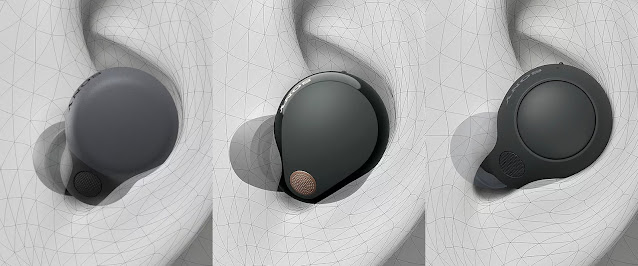

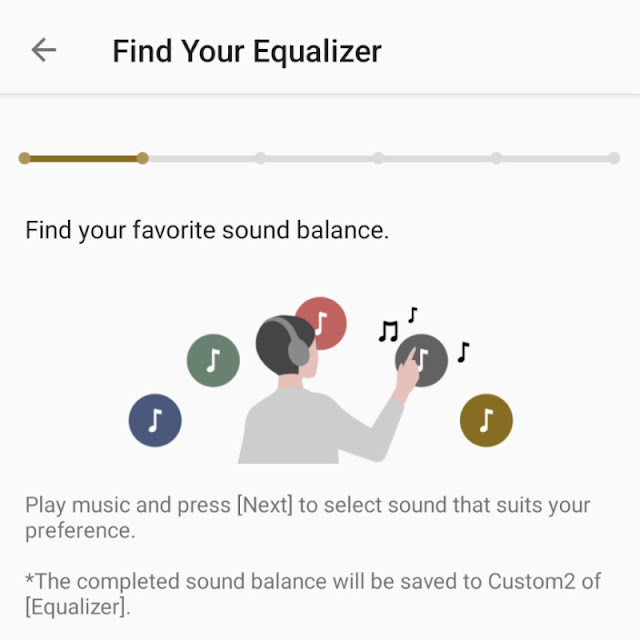
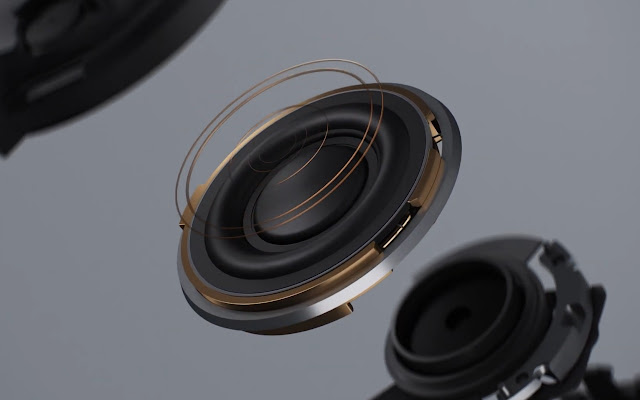
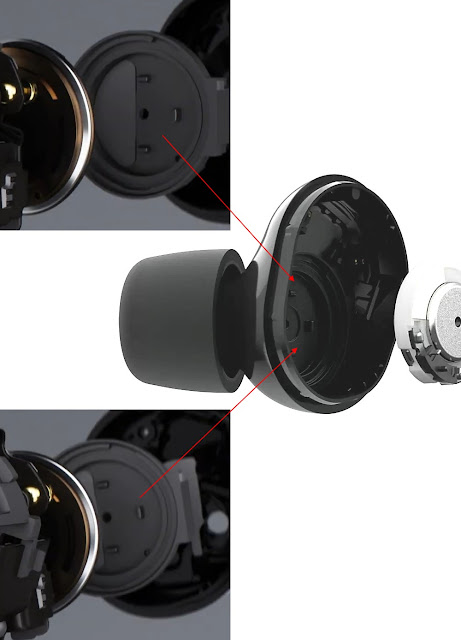

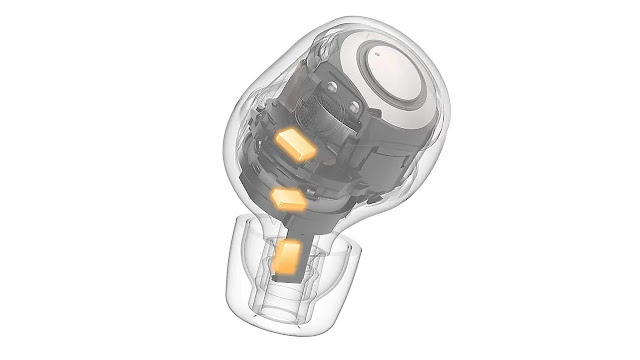
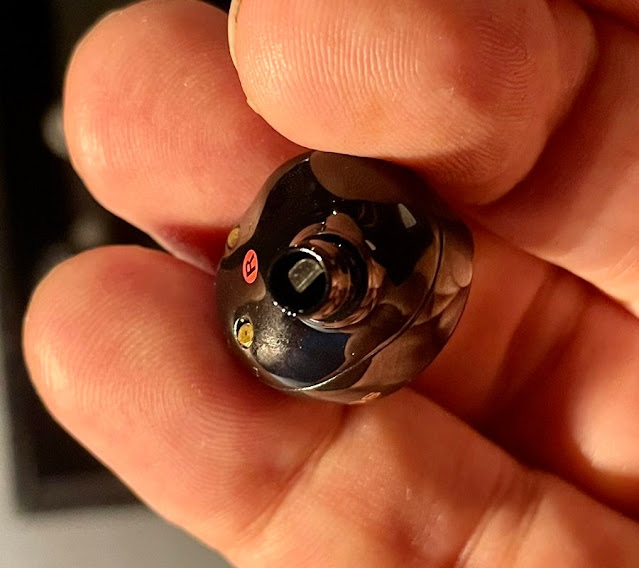
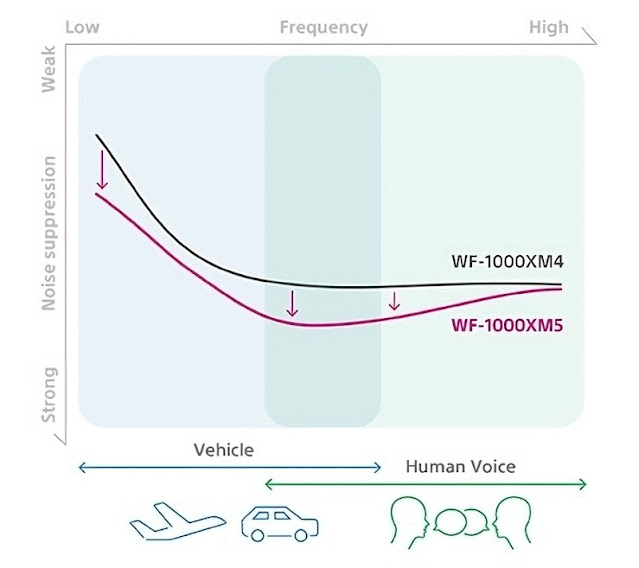

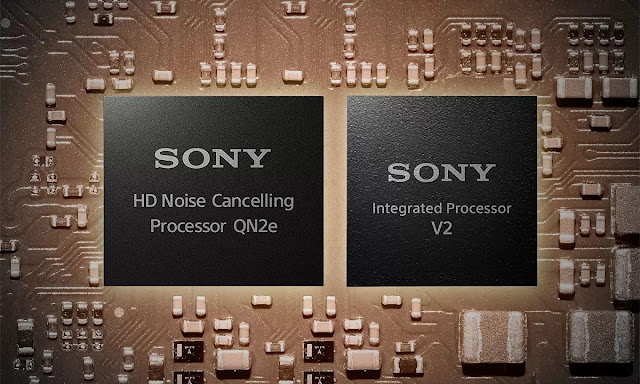


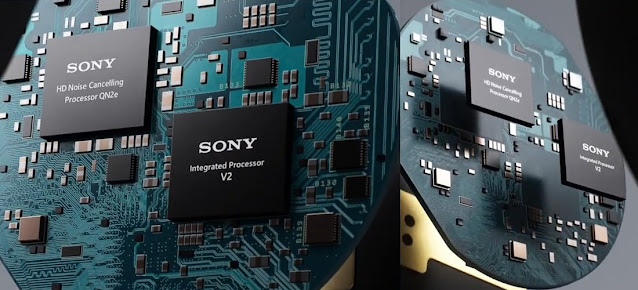
No need to apologize, thanks for the write up, looks like lots of great info.
ReplyDeleteExcelente gracias.
ReplyDeleteMany thanks. The WF-1000XM5 manual is now also available. Interesting are the operating times, especially when compared to the XM4s. LDAC: up to 2 hours longer battery life! Using LC3 doesn't seem to make much sense at the moment, operating times are worse than with AAC, despite the LE Audio mode and some features are not available.
ReplyDeletehttps://helpguide.sony.net/mdr/2963/v1/en/contents/TP1000781965.html
https://helpguide.sony.net/mdr/2963/v1/en/contents/TP1000781980.html
E_D___B_A_N_G_E_R
Ah just my luck, they publish the manual after I publish the post. Yes LC3 right now kind of meh. I wonder if the LDAC times are better since the codec was improved or the new BT SoC is more efficient.
DeleteI think the SoC and the new transmission mode to both ears simultaneously (see https://www.sony.co.uk/headphones/products/wf-1000xm5/features5) might make the difference and I'd be interested in the details (does it work like that in all connection modes and also with devices which support only older Bluetooth versions?) I'm also hoping to be able to use the LDAC 990/909 mode in crowded areas.
DeleteE_D___B_A_N_G_E_R
WF-1000XM4 has the same tech, it's Airoha's MCSync.
DeleteOuch, I must have missed that.
DeleteE_D___B_A_N_G_E_R
Sony doesn't really mention the MCSync, just has the same diagram on the wf-1000xm4 product page like with the wf-1000xm4. see here
Deletehttps://www.sony.co.uk/headphones/products/wf-1000xm4/features6
"The left or right headset unit works as the main headset unit, so it consumes the rechargeable battery faster than the other unit. There is a difference in remaining battery charge between the left and right headset units, but this is not a malfunction.
ReplyDeleteThe left or the right headset unit can be the “main headset unit” depending on the usage environment."
Sony covering their butts when people start asking why the battery life is different from on either side. Guess the MCSync tech is not as good as it should be. But I don't own the original wf-1000x, so no idea how much of a difference the battery life was there between L and R.
DeleteFor WF-1000XM4 users: we should all penalize Sony for not fixing the battery overheating and fast draining issues. They are using cheap and inferior batteries with insufficient testing probably. The updated firmwares came much too late, the damages already done; especially to early batch buyers. For those Sony fans and alike, better delay purchase till next year, when they have their latest firmware installed and prices plunged. Win-win for all
ReplyDeleteHi Ascariss. I've been waiting for these earbuds for so long, but now I'm in doubt. I use my earbuds (Samsung buds pro) a lot for calls and I was ready to change, not being satisfied at all with mine. That said, even if Sony brags about them being great for calls, most of the reviews were really disappointing on that front. I read where you say that the firmware update might help with it, but how can we be sure (or at least be more confident) before actually buying them? All current reviews seem to have been made pre-update. Any suggestions welcome, thanks
ReplyDeleteI've asked a few people on youtube who reviewed it if they updated their units with the new firmware and test out the voice mic, not no replies.
DeleteThank you for your help! It would be great to know what they said if you hear back from them. I also saw that the sound guys are planning to make a new video with a non-pre-production model soon, so hopefully that comes soon as well
DeleteI wonder how sound quality is compared to XM4, several reviewers on youtube were not impressed.
ReplyDeleteThis can be a really subjective opinion. Some think the WHXM4 sounds better than WHXM5, for example, while I think that XM4 has bloaty bass in comparison, which I don't enjoy, and XM5 has cleaner bass and more refinement to the sound.
DeleteThis very detailed comparison forgets to mention that multipoint connection can use LDAC codec on the WF-1000XM5, where with the WF-1000XM4 you have to choose between LDAC or multipoint (maybe to be added in a future update like for the WH_1000XM5 ?).
ReplyDeleteexcept that information wasn't and isn't in the eu press release I saw. the online guide also doesn't have that information. If it was provided to reviewers, that is because they got that information from Sony for their review devices.
DeleteI have just received wf-1000xm5 and I must say that they are nice. The audio quality is really good for TWS earphones. I have not yet tested ANC in rough conditions but the ambient sound mode is good (except for human voices). Only thing I don't like are foam ear tips so I will buy silicone eartips ASAP.
ReplyDeleteAre the eartips the same size as XM4? I have few sets of complyfoammfor my old xm4 whichI lost, would be great if I can use them on xm5.
ReplyDeleteif you mean the connection of the tips to the earbuds, then yes, the same, but I believe the dimensions/shape of the new earbuds are a bit different, but they should work.
DeleteExcelente artículo, por ahora seguiré con el XM4 aún están intactos con un reciente cambio de baterías.
ReplyDeleteEvery review I've read indicates that the ANC is worse than the Boss QC 2. Aaron's review shows that the WF 10005's ANC performance even lost to the AirPods Pro 2. What on earth has Sony been doing these past 2 years
ReplyDeleteI can't give you a proper answer, except that some users on reddit have reported similar thoughts, others have said the ANC is better on the newer model. I can't say, do not own the new model.
DeleteI bought the XM5s as replacement of my XM4s. First impressions:
ReplyDelete1. Buds & case are really much smaller & sleeker which is the biggest advance over the XM4s. Once you've used them, the XM4s immediately feel heavy and bulky and you don't really want to wear them anymore.
2. The glossy part looks not as cheap as initially suspected.
3. The quality of the hinge of the new case is much better than the old one, it doesn't feel that lose anymore.
4. They sound different. Can't say whether it's better or worse. I probably just need to get used to it.
5. The noise cancelling is definitely better than before but it's not a day-and-night difference.
6. LC3 doesn't work with the Xperia 1 V (only with Xperia 1/5 IV according to the patch notes) which is a bit of a joke since it's Sony's current top-of-the line model.
7. The LDAC 990/909 mode still causes dropouts in crowdy public places. 660/606 works fine, so nothing really changed compared to the XM4s
8. The XM4s had a built-in voice that informed about stuff like battery level and the noise cancelling/ambience sound switch. Now it's just tones that don't really give any valuable information. I preferred the voice on the XM4s but there's no way to change it.
E_D___B_A_N_G_E_R
Interesting. I'm reading varying reports on Reddit that the new model is not that good versus the older one, especially the ANC. Hmm I have to save up before I can buy anything.
DeleteI read that too and really wonder how people come to that conclusion. I'd accept if people don't like the different sound but the ANC is definitely a step forward and so is basically everything else.
DeleteE_D___B_A_N_G_E_R
It seems at least some XM5 batches are poised to suffer the same battery fate as the XM4. This is silly at this point. Right now left is 74%, right 93%.
ReplyDeleteThey're going back to where they came from.
https://www.head-fi.org/threads/sony-wf-1000xm5.968488/page-22
Just got the WF-1000XM5s today. At first impression it seems that it can have more trouble keeping a stable connection at 990kbps in comparison to the WF-1000XM4s. Otherwise, I love that the bass is more controlled now. The XM5s sound more open now, I'd say thanks to the new and bigger dynamic drivers. The sound is definitely clearer and less congested. I didn't feel the need to use any EQ for these, contrary to the XM4s. In any case, EQ off sounds different than EQ on with all bands set to 0.
ReplyDeleteI like how smaller than the XM4s they are. The XM4s would cause little discomfort after a while, my outer ear would hurt in a place where the buds were touching it. With the XM5s they either don't sit anywhere on the outer ear, or I just don't feel them! When I take them out after an hour or more I don't feel relief, I just don't really feel anything special, which is very nice. They don't seem like falling out of the ears, and they seem to produce less thumpy noise when walking.
I wish the transparency mode would be even more transparent, but I can definitely live with it.
I'm waiting for LC3 to get out of beta, or to be made usable by other devices too, and not just those 2 Xperia smartphones. I'm curious how the latency is noticeable, or hopefully how it is not noticeable when using certain applications.
My opinion regarding some other opinions that others have about these buds:
1. The buds don't have enough bass no more/they have little (to no?) bass - I think they have plenty of bass, it's just more controlled, it doesn't go nearly as boomy as before, while still sounding solid, filling. The bass is also not there in a song, in the same way, all the time. If a song doesn't have it like that, it doesn't sound like that. If a song calls for bass, these buds can deliver: distortion-free, articulated, textured bass, not just a boom. You can hear the frequency of the bass better now. I listen to this kind of details, so it's definitely appreciated, especially for a pair of wireless buds.
2. The shiny part is trouble - Yeah, I get that, I also wish they weren't shiny, just so you can grip them better with your fingers. This aspect doesn't seem too bad though, I can certainly live with it. I didn't have issues taking them out of the case, but I feel like I have to be more careful when handling the buds. It also doesn't seem to get greasy that easily, so that's a good thing (maybe it was just my experience until now though).
3. The price is big - Yes, I agree, it's kinda big. It wasn't too hard for me to accept it, and I also didn't have any doubt I may not get the buds because of the price, so it wasn't that much of an issue for me. Maybe the price would be reduced in time, or there'd be some reduced price deal, but I honestly couldn't manage my excitement. I have the XM4s, and the WH1000XM5. I preferred the sound of the WH-1000XM5 a lot better than that of the XM4 buds. However, it can be uncomfortable to wear them in the summer because of the heat. The way the XM5 buds sound, I'll definitely use them a lot more!
5. Noise cancelling is worse than that on the XM4s - I don't really think so myself. In my short experience they are actually a bit better like Sony claims. I'll get to use them more in the following days though, so I'll see.
6. The XM5s seem to also have battery issues - I didn't get this kind of issues yet. The difference was never bigger than 5-10% (usually not going over 5%). Sony specifies on their help page: "The left or right headset unit works as the main headset unit, so it consumes the rechargeable battery faster than the other unit. There is a difference in remaining battery charge between the left and right headset units, but this is not a malfunction." - just to keep in mind. In the operating time/codec table they also specify "Max." for all hours specified there (ex. Max. 5 hours), so don't expect it to actually last 5 hours. In any case, they charge really fast, so there's that. Let's hope there are no actual issues with the battery, even though my XM4s are still fine.